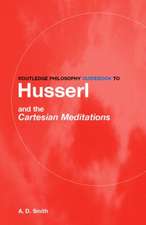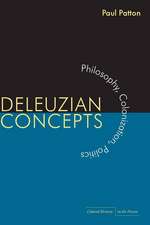Heidegger’s <I>Volk</I>: Between National Socialism and Poetry: Cultural Memory in the Present
Autor James Phillipsen Limba Engleză Paperback – 25 apr 2005
In 1933 the philosopher Martin Heidegger declared his allegiance to Hitler. Ever since, scholars have asked to what extent his work is implicated in Nazism. To address this question properly involves neither conflating Nazism and the continuing philosophical project that is Heidegger's legacy, nor absolving Heidegger and, in the process, turning a deaf ear to what he himself called the philosophical motivations for his political engagement. It is important to establish the terms on which Heidegger aligned himself with National Socialism. On the basis of an untimely but by no means unprecedented understanding of the mission of the German people, the philosopher first joined but then also criticized the movement. An exposition of Heidegger's conception of Volk hence can and must treat its merits and deficiencies as a response to the enduring impasse in contemporary political philosophy of the dilemma between liberalism and authoritarianism.
| Toate formatele și edițiile | Preț | Express |
|---|---|---|
| Paperback (1) | 208.06 lei 3-5 săpt. | |
| Stanford University Press – 25 apr 2005 | 208.06 lei 3-5 săpt. | |
| Hardback (1) | 722.17 lei 6-8 săpt. | |
| Stanford University Press – 27 apr 2005 | 722.17 lei 6-8 săpt. |
Din seria Cultural Memory in the Present
-
 Preț: 173.10 lei
Preț: 173.10 lei -
 Preț: 197.12 lei
Preț: 197.12 lei -
 Preț: 365.56 lei
Preț: 365.56 lei -
 Preț: 193.14 lei
Preț: 193.14 lei -
 Preț: 194.26 lei
Preț: 194.26 lei -
 Preț: 155.84 lei
Preț: 155.84 lei -
 Preț: 155.89 lei
Preț: 155.89 lei -
 Preț: 149.68 lei
Preț: 149.68 lei -
 Preț: 211.98 lei
Preț: 211.98 lei -
 Preț: 228.62 lei
Preț: 228.62 lei -
 Preț: 206.94 lei
Preț: 206.94 lei -
 Preț: 209.36 lei
Preț: 209.36 lei -
 Preț: 193.58 lei
Preț: 193.58 lei -
 Preț: 156.25 lei
Preț: 156.25 lei -
 Preț: 146.22 lei
Preț: 146.22 lei -
 Preț: 171.47 lei
Preț: 171.47 lei -
 Preț: 194.45 lei
Preț: 194.45 lei -
 Preț: 229.26 lei
Preț: 229.26 lei -
 Preț: 296.64 lei
Preț: 296.64 lei -
 Preț: 210.24 lei
Preț: 210.24 lei -
 Preț: 228.62 lei
Preț: 228.62 lei -
 Preț: 278.31 lei
Preț: 278.31 lei -
 Preț: 298.62 lei
Preț: 298.62 lei -
 Preț: 153.16 lei
Preț: 153.16 lei -
 Preț: 193.58 lei
Preț: 193.58 lei -
 Preț: 204.76 lei
Preț: 204.76 lei -
 Preț: 228.39 lei
Preț: 228.39 lei -
 Preț: 139.64 lei
Preț: 139.64 lei -
 Preț: 243.46 lei
Preț: 243.46 lei -
 Preț: 201.90 lei
Preț: 201.90 lei -
 Preț: 152.36 lei
Preț: 152.36 lei -
 Preț: 226.40 lei
Preț: 226.40 lei -
 Preț: 169.59 lei
Preț: 169.59 lei -
 Preț: 197.12 lei
Preț: 197.12 lei -
 Preț: 194.88 lei
Preț: 194.88 lei -
 Preț: 170.65 lei
Preț: 170.65 lei -
 Preț: 194.45 lei
Preț: 194.45 lei -
 Preț: 151.12 lei
Preț: 151.12 lei -
 Preț: 194.01 lei
Preț: 194.01 lei -
 Preț: 194.45 lei
Preț: 194.45 lei -
 Preț: 196.69 lei
Preț: 196.69 lei -
 Preț: 142.73 lei
Preț: 142.73 lei -
 Preț: 466.14 lei
Preț: 466.14 lei -
 Preț: 167.15 lei
Preț: 167.15 lei -
 Preț: 194.45 lei
Preț: 194.45 lei -
 Preț: 173.51 lei
Preț: 173.51 lei -
 Preț: 232.11 lei
Preț: 232.11 lei -
 Preț: 207.13 lei
Preț: 207.13 lei -
 Preț: 150.09 lei
Preț: 150.09 lei
Preț: 208.06 lei
Nou
Puncte Express: 312
Preț estimativ în valută:
39.81€ • 41.57$ • 32.88£
39.81€ • 41.57$ • 32.88£
Carte disponibilă
Livrare economică 26 martie-09 aprilie
Preluare comenzi: 021 569.72.76
Specificații
ISBN-13: 9780804750714
ISBN-10: 0804750718
Pagini: 296
Dimensiuni: 152 x 229 x 18 mm
Greutate: 0.4 kg
Ediția:1
Editura: Stanford University Press
Colecția Stanford University Press
Seria Cultural Memory in the Present
ISBN-10: 0804750718
Pagini: 296
Dimensiuni: 152 x 229 x 18 mm
Greutate: 0.4 kg
Ediția:1
Editura: Stanford University Press
Colecția Stanford University Press
Seria Cultural Memory in the Present
Recenzii
"Phillips presents a masterly and irresistibly learned reading of Heidegger's Volk..." COLLOQUY
"Refusing to supply us with simple answers, Phillips unravels the many philosophical layers involved with Heidegger's Volk, leaving the legacy of the thinker himself in the hands of the individual reader."—International Philosophical Quarterly
Notă biografică
James Phillips is Associate Lecturer at the School of Philosophy, University of Tasmania.
Textul de pe ultima copertă
“Phillips presents a masterly and irresistibly learned reading of Heidegger’s Volk...” COLLOQUY
"Refusing to supply us with simple answers, Phillips unravels the many philosophical layers involved with Heidegger's Volk, leaving the legacy of the thinker himself in the hands of the individual reader."—International Philosophical Quarterly
"Refusing to supply us with simple answers, Phillips unravels the many philosophical layers involved with Heidegger's Volk, leaving the legacy of the thinker himself in the hands of the individual reader."—International Philosophical Quarterly
Descriere
Heidegger's engagement and disillusionment with National Socialism can both be properly seen to rest on the notion of "the people" that he takes over from traditional German nationalism and elaborates in his philosophical critique of the modern subject.























